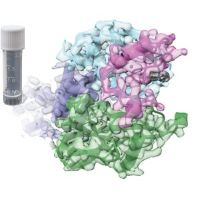Specification
| Description | Recombinant protein from the full-length sequence of homo sapiens acyloxyacyl hydrolase (AOAH), transcript variant 1 (NM_001637). |
| Organism | Homo sapiens (Human) |
| Expression Host | Human Cells |
| Tag Info | His or DYKDDDDK. Please contact us if you need further information or require specific designed tag. |
| Purity | Greater than 90% by SDS-PAGE gel |
| Uniprot ID | P28039 |
| Entry Name | AOAH_HUMAN |
| Gene Names | AOAH |
| Alternative Gene Names | |
| Alternative Protein Names | Acyloxyacyl hydrolase (EC 3.1.1.77) [Cleaved into: Acyloxyacyl hydrolase small subunit; Acyloxyacyl hydrolase large subunit] |
| Application | Antigens, Western, ELISA and other in vitro binding or in vivo functional assays, and protein-protein interaction studies; For research & development use only! |
| Buffer | Purified protein formulated in a sterile solution of PBS buffer, pH7.2, without any preservatives |
| Endotoxin | Endotoxin level is < 0.1 ng/µg of protein (<1EU /µg) |
| Length | 575 |
| Molecular Weight(Da) | 65105 |
| Protein Sequence | (The sequence of expressed protein may have some variation from the sequence shown below. Please contact us for the exact sequence.) MQSPWKILTVAPLFLLLSLQSSASPANDDQSRPSLSNGHTCVGCVLVVSVIEQLAQVHNSTVQASMERLCSYLPEKLFLKTTCYLVIDKFGSDIIKLLSADMNADVVCHTLEFCKQNTGQPLCHLYPLPKETWKFTLQKARQIVKKSPILKYSRSGSDICSLPVLAKICQKIKLAMEQSVPFKDVDSDKYSVFPTLRGYHWRGRDCNDSDESVYPGRRPNNWDVHQDSNCNGIWGVDPKDGVPYEKKFCEGSQPRGIILLGDSAGAHFHISPEWITASQMSLNSFINLPTALTNELDWPQLSGATGFLDSTVGIKEKSIYLRLWKRNHCNHRDYQNISRNGASSRNLKKFIESLSRNKVLDYPAIVIYAMIGNDVCSGKSDPVPAMTTPEKLYSNVMQTLKHLNSHLPNGSHVILYGLPDGTFLWDNLHNRYHPLGQLNKDMTYAQLYSFLNCLQVSPCHGWMSSNKTLRTLTSERAEQLSNTLKKIAASEKFTNFNLFYMDFAFHEIIQEWQKRGGQPWQLIEPVDGFHPNEVALLLLADHFWKKVQLQWPQILGKENPFNPQIKQVFGDQGGH |
Background
| Function | FUNCTION: Removes the secondary (acyloxyacyl-linked) fatty acyl chains from the lipid A region of bacterial lipopolysaccharides (PubMed:1883828, PubMed:8089145, PubMed:29343645). By breaking down LPS, terminates the host response to bacterial infection and prevents prolonged and damaging inflammatory responses (By similarity). In peritoneal macrophages, seems to be important for recovery from a state of immune tolerance following infection by Gram-negative bacteria (By similarity). {ECO:0000250|UniProtKB:O35298, ECO:0000269|PubMed:1883828, ECO:0000269|PubMed:29343645, ECO:0000269|PubMed:8089145}. |
| Pathway | |
| Protein Families | |
| Tissue Specificity |
QC Data
| Note | Please contact us for QC Data |
| Product Image (Reference Only) |  |

